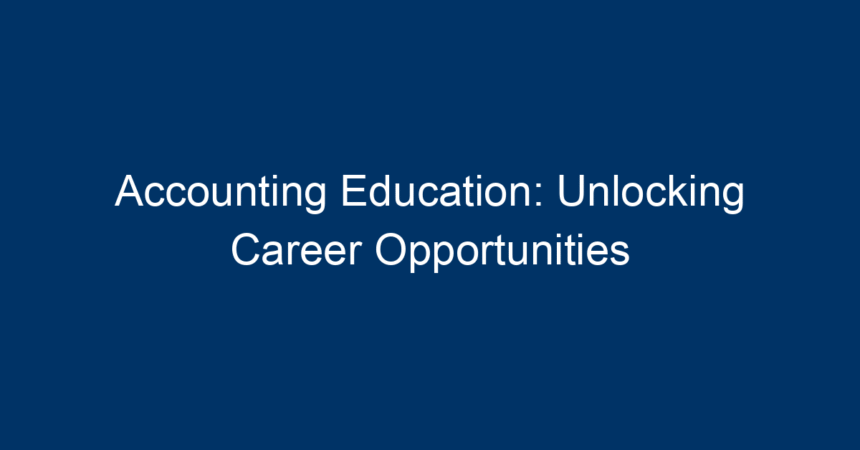In today’s ever-evolving financial landscape, accounting education serves as a gateway to a myriad of career opportunities. Whether you’re a recent high school graduate or looking to make a career switch, understanding the value of accounting education can significantly impact your professional journey. In this article, we will explore the essentials of accounting education, the various career paths it opens, and actionable insights to help you embark on your journey toward a rewarding career in accounting.
The Importance of Accounting Education
Accounting is often dubbed the "language of business." It provides individuals and organizations with the necessary tools to make informed financial decisions. Without a robust accounting education, navigating the complexities of finance can become daunting. Here’s why investing in accounting education is essential:
Knowledge Foundation
Accounting education equips students with a solid foundation in financial principles, taxation, auditing, and managerial accounting. This knowledge not only makes future tasks easier but also builds a critical understanding of how businesses operate.
Skill Development
Alongside theoretical knowledge, accounting programs emphasize the importance of practical skills. Students learn to employ software tools, analyze financial data, and develop critical thinking skills. This combination of knowledge and skill prepares students for real-world challenges.
Career Advancement
In the competitive job market, having formal accounting education can be a differentiator. Employers often prefer candidates who possess accredited degrees and certifications, as these qualifications validate a candidate’s expertise and commitment to the field.
Types of Accounting Education Programs
The realm of accounting education offers various programs tailored to fit different career aspirations and educational backgrounds. Here’s a breakdown of the most common accounting education options:
1. Associate Degree in Accounting
An associate degree typically takes about two years to complete and provides foundational knowledge in accounting principles and practices. This entry-level qualification can lead to positions such as bookkeeping or accounting assistant, setting the stage for further education.
2. Bachelor’s Degree in Accounting
A bachelor’s degree, usually requiring four years of study, dives deeper into accounting concepts, financial analysis, and compliance. Graduates can pursue roles in public accounting, corporate accounting, and governmental accounting. Additionally, this degree is often a prerequisite for obtaining professional certifications such as CPA (Certified Public Accountant).
3. Master’s Degree in Accounting
For those seeking advanced knowledge and specialized skills, a master’s degree—particularly a Master of Accountancy (MAcc)—is ideal. This program not only enhances expertise but can also facilitate CPA eligibility in many states. Graduates from master’s programs can step into roles such as forensic accountants or financial managers.
4. Certification Programs
Certifications like CPA, CMA (Certified Management Accountant), and CISA (Certified Information Systems Auditor) provide additional credentialing that enhances job prospects and salary potential. Many accounting education programs prepare students for these certifications, making them invaluable for career growth.
Career Opportunities in Accounting
Accounting education paves the way for numerous career paths. Let’s delve into some of the most sought-after roles in the field:
1. Certified Public Accountant (CPA)
CPAs are trusted advisors who provide a range of financial services, including tax preparation, auditing, and financial consulting. Earning this credential can significantly boost your career prospects and is often associated with higher earning potential.
2. Management Accountant
Management accountants focus on internal business operations. They offer insights into financial planning, performance management, and strategic decision-making, playing a vital role in an organization’s success.
3. Auditor
Auditors evaluate financial statements and ensure compliance with regulations. There are various paths, including internal and external auditors, each with unique responsibilities and functions within an organization.
4. Forensic Accountant
Forensic accountants specialize in investigating financial discrepancies and fraud. Their skills are crucial in legal cases and help maintain the integrity of financial practices.
5. Financial Analyst
Financial analysts assess investment opportunities, conduct market research, and provide data-driven recommendations. Their role is pivotal in guiding businesses toward financial growth.
6. Tax Advisor
Tax advisors help individuals and organizations navigate the complexities of tax regulations. This role requires in-depth knowledge of tax law and the ability to strategize for tax efficiency.
Choosing the Right Accounting Education Path
When considering accounting education, it’s essential to choose a path that aligns with your career goals. Here are some factors to consider:
Personal Interests
Reflect on what aspects of accounting interest you the most. Whether it’s tax regulations, financial reporting, or forensic investigation, understanding your interests can help in selecting the right educational path.
Career Goals
Identify your long-term career aspirations. If your goal is to become a CPA, pursuing a bachelor’s in accounting followed by a master’s can set you on the right track.
Flexibility and Format
Consider whether you prefer traditional in-person classes, online programs, or a hybrid approach. Many universities offer flexible learning options to accommodate working professionals or students with other commitments.
Actionable Insights for Prospective Accounting Students
Embarking on a journey in accounting education requires preparation and commitment. Here are some actionable insights to help you succeed:
1. Research Accredited Programs
Ensure you choose an accredited institution recognized in the industry. This validation can enhance your resume and open doors for internships and job placements.
2. Network Within the Field
Join accounting student organizations and professional associations such as the AICPA (American Institute of Certified Public Accountants). Networking can provide valuable connections and insights into the industry.
3. Seek Internship Opportunities
Gaining practical experience through internships can be invaluable. Internships not only enhance your resume but also allow you to apply your knowledge in real-world scenarios.
4. Stay Updated on Industry Trends
The world of accounting is continuously evolving. Stay informed about new regulations, technological advancements, and industry trends through professional journals and accounting forums.
5. Consider Certification Early
If you aim to pursue certifications like the CPA or CMA, start planning early. Familiarize yourself with the requirements and consider integrating the preparation into your educational journey.
Conclusion
Accounting education is more than just learning numbers; it’s about understanding how businesses function and making informed financial decisions. With various educational paths and diverse career opportunities, pursuing an accounting education can unlock a wealth of possibilities. By choosing the right program, continuously networking, and staying updated on the latest trends, you can build a fulfilling career in accounting.
Embrace the journey of accounting education—unlock your potential, explore diverse career paths, and take proactive steps toward a rewarding future in the financial world. Your career in accounting is not just a job; it’s a versatile and impactful profession that shapes the economic landscape. Start today, and watch your career flourish!




